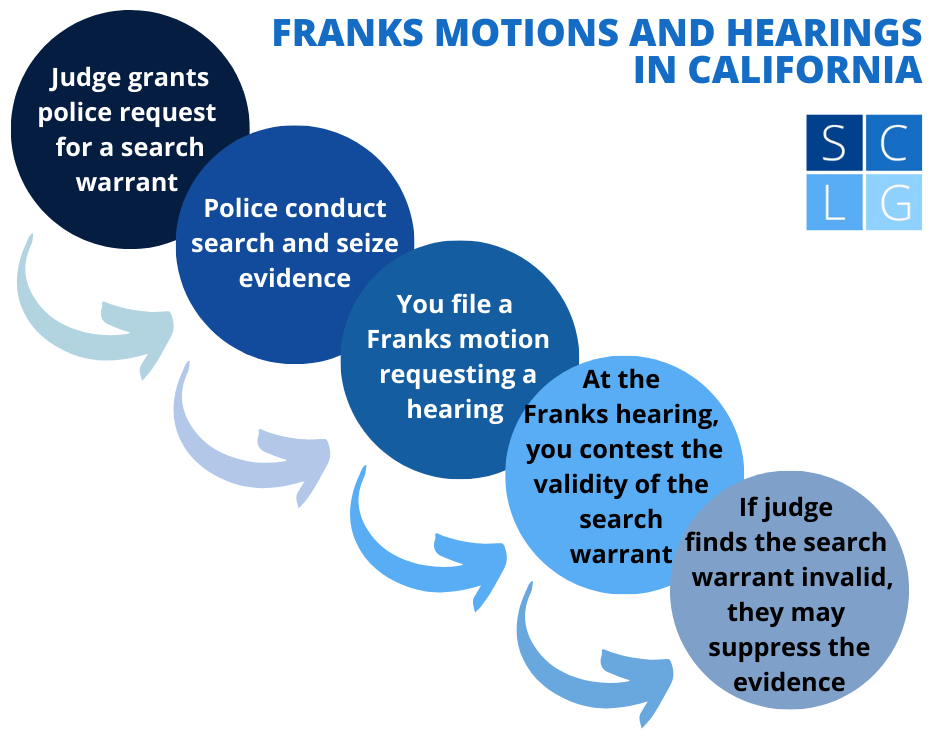
A Franks hearing is a legal proceeding in a criminal case where you try to traverse a search warrant. Traversing a warrant means that you challenge the truth of the information that is used to support it.
A Franks motion is the legal document given to the judge that sets forth your request for a hearing and the specific challenges that you have.1
This type of hearing is typically conducted after a search and seizure have taken place. If you are successful at the hearing, then the judge will throw out (or suppress) all of the evidence, or some, that was seized under the warrant.

Note that the Fourth Amendment of the United States Constitution says that a search warrant can only be issued upon a showing of probable cause. “Probable cause” is a reasonable belief that:
- criminal activity has taken place, or
- criminal activity is taking place.
A motion to traverse, then, challenges the truth of the information that tries to establish probable cause for the issuance of a search warrant. Under California law, you can challenge other warrants in addition to search warrants. For example, you are free to challenge both:
Our California criminal defense attorneys will highlight the following in this article:
- 1. Franks motions and hearings
- 2. Search warrants
- 3. How search warrants get issued
- 4. Challenging other warrants
- Additional reading

A Franks hearing is typically conducted after a search and seizure has taken place.
1. Franks motions and hearings
To challenge the affidavit that a search warrant is based on, you can file a Franks motion. A Franks motion questions the information in the affidavit by providing evidence showing that:
- it contained a false statement or misstatements of facts,
- it contained false information or material information that was false,
- it was made with a reckless disregard for the truth, and/or
- it contained deliberately misleading information or omissions that the judge used to issue the warrant.2
Note, too, that the motion can show that authorities intentionally left out of the affidavit material information that would have prevented the warrant being granted.3
If the judge grants the motion
If the trial court finds your Franks motion contains persuasive (“prima facie”) evidence that the affidavit is based on false pretenses or reckless disregard for the facts, then the judge holds a Franks hearing.
A Franks hearing is an evidentiary hearing held in the judge’s chambers.4 During the hearing, you or your defense attorney presents evidence for why the search warrant should not have been ordered. You can also subpoena witnesses who can testify as to the affidavit’s untruthfulness.
In addition, the judge at the suppression hearing may question the person who wrote the affidavit, who is known as the affiant. The judge asks questions to determine if the affidavit has:
- falsities,
- misrepresentations, or
- inaccuracies.
Franks hearings are typically held after a search has been conducted.
What the judge can do
If you set forth a substantial preliminary showing that the affidavit was false, then the judge may:
- grant the Franks order, and
- suppress, or throw out, some or all of the evidence seized under the warrant.
The “exclusionary rule” is the law that prohibits the use of illegally obtained evidence in a criminal trial. The rule was established by the Supreme Court in 1961.5
2. Search warrants
To obtain a lawful search warrant, law enforcement authorities must show or establish probable cause.6 “Probable cause” means a reasonable belief that criminal activity took place or is taking place.
The Fourth Amendment of the U.S. Constitution states that:
- no warrants shall be issued but upon probable cause, and
- the warrant must describe with particularity the place to be searched and the persons or things to be seized.
Contents of search warrants
As to this last requirement, a search warrant affidavit must set forth the following information:
- the name of the person to be searched, or
- a specific description of the property to be searched, and
- a description of the property, thing, or things to be searched for.7
A judge rules on whether there is a finding of probable cause. They make a probable cause determination by analyzing the facts of the case.
Note that there is no one set standard (such as preponderance of the evidence) that a judge will use in determining whether there is or is not probable cause to grant a search warrant application.

Search warrants are issued and signed by a California judge and can only be issued if they find probable cause of a criminal act.
3. How search warrants get issued
Search warrants are issued and signed by a judge. A judge can only issue the warrant if they find probable cause of a criminal act.
Note that before making this finding, a judge may question:
- law enforcement officers,
- the prosecutor, and/or
- any witnesses named in the affidavit.
If issued, a search warrant directs a police officer to command a search for certain things or personal property listed in the warrant.
Affidavits in support of search warrants
To obtain a search warrant, a police department officer must submit a search warrant affidavit to the judge. This document gives the reasons why they should allow law enforcement to conduct a search. Sometimes an affidavit will include statements from a confidential informant.
Affidavits can be written or oral. They can be submitted to a judge either in person or via:
- telephone,
- fax, or
- email.
All affidavits are submitted under penalty of perjury.
4. Challenging other warrants
You can challenge other warrants besides search warrants. For example, you can contest both:
- arrest warrants, and
- bench warrants.
Arrest warrants
A motion to quash an arrest warrant is a claim that an arrest warrant is invalid or illegal.
An arrest warrant is issued when a magistrate is satisfied that there are reasonable grounds to believe that you have committed a crime.8
Bench warrants
A bench warrant, on the other hand, is an arrest warrant issued by a judge in court for your failure to appear in court.
Under Penal Code 978.5, a bench warrant may be issued when you fail to appear after being:
- ordered to personally appear in court at a specific time and place,
- released from custody on bail and ordered to appear at a specific time and place,
- released from custody on your own recognizance and promise to appear,
- released upon citation and signed a promise to appear in court,
- authorized to appear by counsel and the court ordered that you personally appear.9
To challenge or “recall” a bench warrant, a case needs to be put on the calendar in the courtroom where it was issued. Then an oral motion to quash or recall can be made to the judge.
A judge will recall a warrant if you have complied with the original order to appear.
Additional reading
For more in-depth information on search warrants, refer to these scholarly articles:
- The Execution of Search Warrants – Colorado Law Scholarly Commons.
- Search Warrants, Motions to Suppress and Lost Cases: The Effects of the Exclusionary Rule in Seven Jurisdictions – Journal of Criminal Law & Criminology.
- Press One for Warrant: Reinventing the Fourth Amendment’s Search Warrant Requirement through Electronic Procedures – Vanderbilt Law Review.
- The Search Warrant, the Magistrate, and Judicial Review – New York University Law Review.
- The Post-Riley Search Warrant: Search Protocols and Particularity in Cell Phone Searches – Vanderbilt Law Review.
Legal References:
- See Franks v. Delaware (1978) 438 U.S. 154. See also United States v. Veloz (2020) 948 F.3d 418.
- People v. Box (1993) 14 Cal.App.4th 177.
- People v. Luttenberger (1990) 50 Cal.3d. 1. See also People v. Sandoval (2015) 62 Cal.4th 394.
- See, e.g., People v. Estrada (California Court of Appeals, 2003) 105 Cal.App.4th 783.
- Mapp v. Ohio (1961) 367 U.S. 643.
- Illinois v. Gates (1982) 462 U.S. 213.
- United States v. Cruz (2014) 774 F.3d 1278, 1290.
- See California Penal Code 813 and 827.1.
- California Penal Code 978.5.

